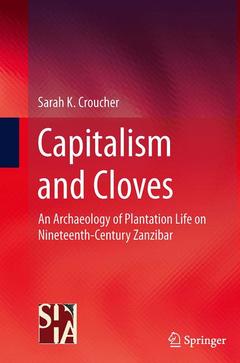Capitalism and Cloves, 2015 An Archaeology of Plantation Life on Nineteenth-Century Zanzibar
Auteur : Croucher Sarah K.

This study of nineteenth-century clove plantations on Zanzibar provides an important contribution to debates in global historical archaeology. Broadening plantation archaeology beyond the Atlantic World, this work addresses plantations run by Omani Arab colonial rulers of Zanzibar. Drawing on archaeological and historical data, this book argues for the need to examine non-Western contexts of colonialism and capitalism as coeval with those in the North Atlantic World. This work explores themes of capitalism, colonialism, plantation landscapes, African Diaspora communities, gender and sexuality, locally produced and imported goods in historic contexts, and Islamic historical archaeology.
Chapter 1: Introduction.- Chapter 2: Why Clove Plantations? East African Archaeology, History and Anthropology.- Chapter 3: Plantation Landscapes.- Chapter 4: The Archaeology of Slavery.- Chapter 5: Plantation Households.- Chapter 6: Global Goods.- Chapter 7: Pemban People: Local Ceramics and Changing Identities.- Chapter 8: Capitalism and Cloves: East African Historical Archaeology.
Sarah K. Croucher is an Assistant Professor of Anthropology, Archaeology, and Feminist, Gender & Sexuality Studies at Wesleyan University. Her research broadly explores nineteenth-century African Diaspora contexts, largely through the study of East Africa. She is interested in questions of identity and power, and theoretical debates in historical archaeology. Her current research is based in Middletown, Connecticut, where she directs a community archaeology project examining the Beman Triangle, a mid-nineteenth century free African American community associated with the AME Zion Church where she is examining racialized, gendered, and community identities in relation to the neighborhood landscape.
Provides new insight into colonialism in a non-Western setting
Detailed case study presented in larger theoretical framework
Explores common historical archaeological themes in a new context
Includes supplementary material: sn.pub/extras
Date de parution : 08-2016
Ouvrage de 256 p.
15.5x23.5 cm
Disponible chez l'éditeur (délai d'approvisionnement : 15 jours).
Prix indicatif 52,74 €
Ajouter au panierDate de parution : 10-2014
Ouvrage de 256 p.
15.5x23.5 cm
Disponible chez l'éditeur (délai d'approvisionnement : 15 jours).
Prix indicatif 52,74 €
Ajouter au panier


